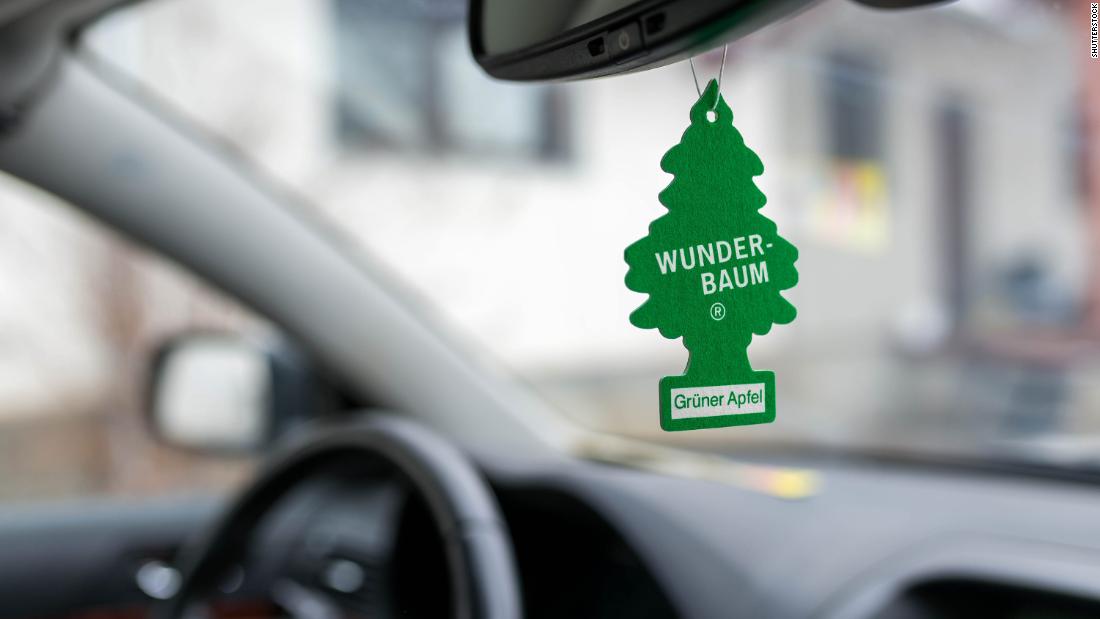Moments before police fatally shot Daunte Wright during a traffic check Sunday in a Minneapolis suburb, he called his mother and told her he had been arrested for hanging air freshener on the rearview mirror.
It is unclear what role air fresheners played in traffic control. Brooklyn Center Police Chief Tim Gannon told reporters Monday that Wright was originally pulled over for an overdue ticket and that when officers approached his car, they saw an item hanging from the rearview mirror.
Cops searched Wright’s name and found a felony misdemeanor warrant, Gannon said, without providing additional details about the hanging item or the warrant. He said the shooting appeared to be “accidental.”
But Minnesota is one of at least several states with laws that prohibit hanging items from a vehicle’s rearview mirror or placing them on the windshield on the grounds that they could obstruct a driver’s vision.
“A person must not drive or operate any motor vehicle with any object suspended between the driver and the windshield, except: sun visors; rear view mirrors; driver feedback and safety monitoring equipment when mounted immediately behind, slightly above, or slightly below the rear view mirror,” states Minnesota law.
These minor infractions have been questioned by black motorists and others who see them as a pretext for racially motivated traffic stops.
“We are concerned that the police appear to have used the hanging air fresheners as an excuse to make a pretextual stop, something that the police do too often to attack black people,” the American Civil Liberties Union (ACLU) of Minnesota said Sunday. . He called for an independent investigation into the shooting.
Wright’s death has sparked protests and further increased tensions in a city already on edge over the death of another black man at the hands of the police. Testimony continued Monday at the trial of former Minneapolis police officer Derek Chauvin, who is charged in George Floyd’s death in May 2020.
Air fresheners in cars have led to legal challenges
Police traffic stops due to hanging air fresheners have already led to several court challenges.
In September 2018, police detained two black men in Chicago for having air freshener hanging from a rearview mirror. During the stop, the officers found weapons in the vehicle, and each of the men was charged with illegal possession of a firearm by a criminal.
The men did not claim racial profiling. But they tried to suppress the evidence, arguing that the air freshener wasn’t probable cause enough for officers to stop them.
Last year, a federal appeals court ruled that making those stops was legitimate, saying police had “reasonable suspicions” to believe that the tree-shaped air freshener obstructed the driver’s view. Both men were sentenced to prison.
In October 2012, WNBA star Seimone Augustus, then a Minnesota Lynx player, complained on Twitter that she had been detained at a mall in Roseville, a suburb of Minneapolis, for having air freshener in her car. She said the agent later questioned her about her out-of-state license plates and other crimes in the area.
“Supposedly he stopped me for an air freshener hanging in my window, but then he kept talking about robbery at the mall,” tweeted Augustus, who is black. “And the fact that my car was in the mall without license plates in the city. I thought this was a free country.”
A Roseville police spokesman told ESPN that the traffic stop had nothing to do with race and that Augustus was only issued a warning.
Virginia just added another provision to her law
Several other states, including California, Pennsylvania and Arizona, prohibit drivers from hanging things that obstruct their vision near the windshield.
Under Arizona state law, it is illegal to have an object near the rear view mirror or side mirrors if it “obstructs or reduces” the driver’s view.
But a deputy sheriff was fired in Arizona last year after he pulled over a black man for having air freshener hanging from his rearview mirror, then repeatedly asked him if he had drugs in the car.
In Virginia, a “hanging object” near a car’s windshield used to be grounds for a valid stop, but a new law that went into effect March 1 changed things, said Andrew Flusche, a traffic attorney in Stafford, Virginia. .
“Virginia still penalizes hanging objects, but police must now have another justification first for stopping the vehicle,” he said.
“Hanging object stops are a classic example of a pretextual stop, where the police look for a valid reason to stop a motorist for something else, such as suspected driving under the influence of alcohol or drugs or perhaps to try to search the vehicle.” Said Flusche.
Police say “pretext” stops are necessary to fight crime
So-called “pretext stops” allow police to use minor traffic violations or broken taillights as a basis for investigating motorists for more serious crimes.
Police have defended the arrests as crucial to combating illegal drug possession, gun possession, human trafficking and drunk driving.
But civil rights groups say the tactic unfairly targets black drivers.
In 2018, the American Civil Liberties Union sued the Bakersfield Police Department in California after its officers incarcerated a black man who was driving a car that had air freshener hanging from his rearview mirror. Police also demanded personal information from the passengers, the ACLU said.
The City of Bakersfield settled the lawsuit in 2019 without admitting any liability.

